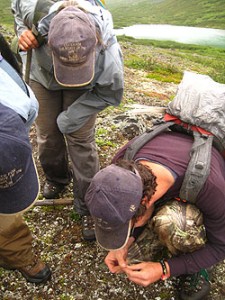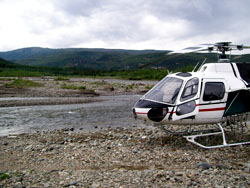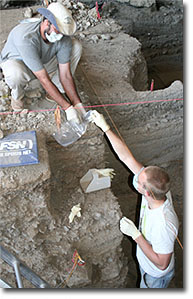Endowment Giving
Your gift is crucial to the Center!
![]()
Endowment Giving: Developing a Legacy
 Currently, the funding received is adequate to maintain the status quo at the Center, but to move forward and keep the Center at the forefront of First Americans research requires additional funds.
Currently, the funding received is adequate to maintain the status quo at the Center, but to move forward and keep the Center at the forefront of First Americans research requires additional funds.
New permanent endowments are needed.
Over the next nine years we hope to expand endowments by $4.7 million. This would include endowment growth in three arenas; research, education, and public and professional outreach. Achieving these initiatives would truly make the Center for the Study of the First Americans the hub for peopling of the Americas research, education, and outreach, making us the national and international center of First Americans studies.
 Research Support
Research Support
The primary mission is research. Center personnel are very active in field and laboratory research from Siberia to Mexico. Field and laboratory research into First Americans studies is expensive. Field equipment, vehicle rental, and lab equipment and analyses contribute to the expense. Radiocarbon and luminescence dates range from $800-$1300 each. Field work in Alaska (a major Center field site) is remote and often requires the use of helicopters for access. Helicopter support is more than $1000 per hour.

Geneticists collecting human coprolites from sediments at Bonneville Estates Rockshelter in Nevada. Cutting-edge analyses such as these are changing the way we think about the origins of the first Americans.
New analytical methods continue to develop, such as ancient DNA analyses, and the application of these methods are expensive to fund. Though Center personnel have been successful in obtaining funding from outside agencies, support is limited, extremely competitive, and designed to fund low-risk, short-term projects, typically on an annual basis.
The only way to sustain long-term research is through continual and reliable endowment funding.
Much of First Americans research is exploratory and considered high-risk. This type of research can only be achieved through research endowments. The Center’s research mission is expanding to include work in remote places like Siberia, Alaska, Mexico, and South America and new analytical approaches. To this end we wish to increase research endowment by $1 million, providing an additional $50,000 annually for research support.
Education Support
A top priority in building the Center’s endowment is in education. There are five ways in which we would like to enhance our educational endowment. The goal is to expand education endowments by $2.2 million.
PhD Student Research Assistantships
For Center growth we need to attract top notch students. To do so, we would like to offer three Research Assistantships in First Americans Studies. Each research assistantship would fund a PhD student for three years, and each student research assistant would be taking courses, conducting research, and assisting with Center research projects. A student would be awarded an assistantship each year for three years. With three assistantships, a new student could be cycled into a vacating position every year.
Student Dissertation Research Support
Support is needed to fund PhD student dissertation research. All Center students are required to apply for external funding (such as to National Science Foundation for a dissertation improvement grant) to support their dissertation research. We would like to be able to supplement such awards as well as fund quality proposals that deserve funding, but that may be rejected by external granting agencies due to high competition. Supplements to external awards would cover the high cost of archaeological research (for example, travel support for student crews, dating of samples, or chemical analyses of lithics or sediments).
Dissertation Fellowship
This program would fund one PhD student in the last year of his or her degree program while the student is finishing their dissertation. Such a fellowship would be awarded to one student per academic year, covering the Fall and Spring semesters (9 months). This funding is critical to many deserving students because it would allow them to focus and finish their dissertations in a timely fashion. It would allow students to prepare publications based on their dissertation research, enhancing the student’s credentials when applying for career positions.
Expansion of the Roy J. Shlemon Scholarship Program
The Roy J. Shlemon Scholarship program is heading us in the right direction by providing Center students with funds to support summer field research in geoarchaeology. In addition, we would like to expand this program by obtaining funding to cover student expenses related not only to participation in Center field projects, but also laboratory and workshop experiences. We would like to offer both graduate and undergraduate students the opportunity to attend workshops and field trips sponsored by the Center and other organizations and obtain valuable archaeological and geoarchaeological field experience under the guidance of Center faculty.
Public and Professional Outreach Priorities
At the Center, it is valuable to provide public and professional outreach services. Ways to do this are to develop a guest speaker and advanced seminar series as well as a decadal convention and offer a post-doctoral scholar in residence position.
Speaker Series, Advanced Seminar Series, and Convention Funding
It is very important for scholars to visit the Center, present lectures, and interact with students. This type of interaction is vital to our mission of teaching and research. Toward this goal, the Center would like to have a permanent Speaker Series Endowment, Advanced Seminar Series Endowment, and First Americans Convention Endowment. On an annual basis we would like to host two speakers active in First Americans research. The average cost to bring a speaker to the Texas A&M University campus is about $2000. Therefore, a budget of about $4000 per year is needed. Creation of a Center for the Study of the First Americans Advanced Seminar to be held at the Center biannually would bring together ten to twenty scholars to discuss and debate important topics in our research. Each would be a two-to three-day seminar with a specific topic to be discussed in detail. An edited volume of seminar publication papers would be published in the Center’s book series. Students would be involved in development of the seminars and interact with scholars from all over the world. Funding would be used to bring scholars to the Center and provide lodging and food. These seminars would require about $20,000 to produce. Every decade the Center will host a public convention on First Americans research. This convention will showcase discoveries of the last decade, attracting up to 1500 professionals, avocationalists, and members of the interested public. Conventions require about $50,000 to produce. Our public and professional outreach program will need an endowment of $500,000 to bring speakers to the Center, produce biannual workshops, and support large conventions.
Post-Doctoral Scholar in Residence
The Center would like to annually host a one-year post-doctoral scholar in residence. This would typically be a recently graduated PhD student in First Americans studies from another institution. The position would require the scholar to teach one seminar, organize visiting speakers and advanced workshops, present two general lectures each semester, pursue research, interact with students, provide a fresh perspective, and contribute to Center research.
| Summary of Endowment Priorities | |
|---|---|
| Research | |
| Enhance Research Endowment | $1,000,000 |
| Education | |
| PhD Student Research Assistantships | $1,000,000 |
| Student Dissertation Research Support | $400,000 |
| Dissertation Fellowship | $400,000 |
| Expansion of the Roy J. Shlemon Scholarship Program | $400,000 |
| Public and Professional Outreach | |
| Speaker Series, Advanced Seminar, and Convention Funding | $500,000 |
| Post-Doctoral Scholar in Residence | $1,000,000 |
